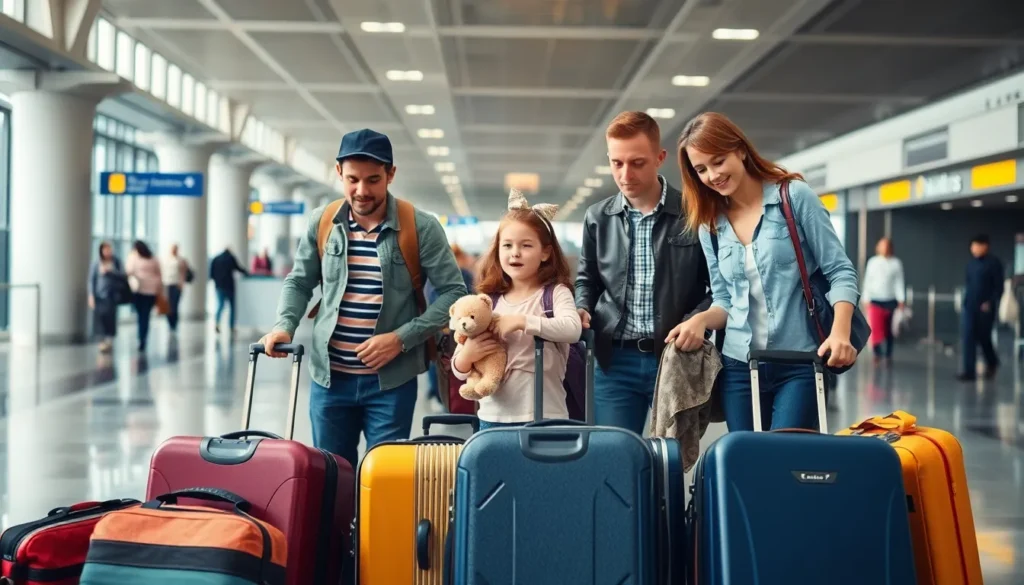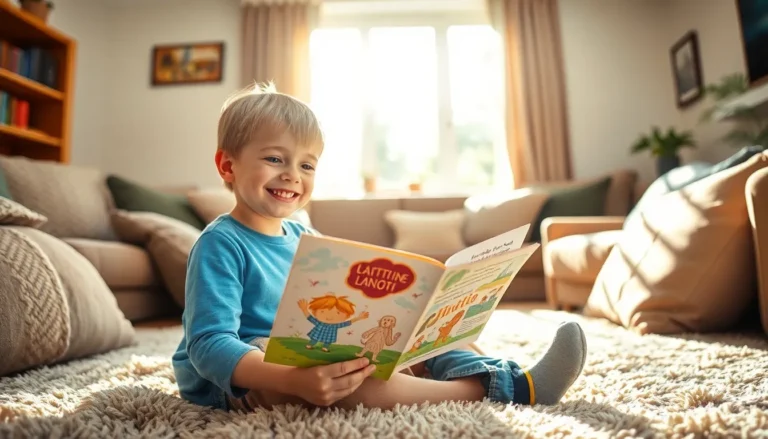Table of Contents
ToggleFamily travel can feel like a high-stakes game of Tetris, where every piece is a child, a suitcase, or a snack that just won’t fit. As excitement builds for the adventure ahead, so does the stress of coordinating schedules, packing essentials, and managing the inevitable meltdowns. It’s a delicate balance between creating unforgettable memories and maintaining sanity.
Understanding Family Travel Stress
Family travel often brings excitement but also significant stress. Managing schedules, packing, and addressing children’s needs can lead to conflict.
Common Causes of Stress
Packing efficiently poses a challenge for many families. Limited space in vehicles or luggage creates tension. Another source of stress stems from children’s inability to adapt quickly to changes. Younger children struggle with long flights or delays, leading to meltdowns. Conflicting schedules also amplify worries, particularly when activities overlap. Unexpected events, like illness or weather changes, add unpredictability. Budget considerations frequently become a point of contention as families assess costs associated with travel, activities, and accommodations.
Impact on Family Dynamics
Travel stress affects family interactions. Tension can arise between parents when disagreements occur about planning and logistics. Children often mirror this stress, which leads to irritability and restlessness. Frequent arguments during travel detract from bonding experiences. Moments intended for enjoyment may transform into frustration. Traveling during peak seasons heightens these challenges, as larger crowds lead to longer wait times and more chaos. Strong communication, despite strain, fosters resilience and encourages teamwork. Prioritizing children’s needs helps maintain a positive atmosphere during travel.
Strategies to Manage Family Travel Stress


Effective strategies can significantly reduce family travel stress. Taking the right steps in planning and communication creates a smoother experience for everyone involved.
Planning and Preparation Tips
Creating a checklist simplifies packing. Include essentials like clothes, toiletries, and snacks. Gathering items in advance reduces last-minute scrambling. Booking accommodations with family-friendly amenities can enhance comfort. Recognizing that flexibility in travel itineraries lessens stress can lead to a more enjoyable trip. Preparing for unexpected events by adding a first-aid kit and extra snacks ensures peace of mind. Children respond positively when they know what to expect, so sharing the itinerary with them can create excitement.
Communication Within the Family
Establishing clear guidelines before the trip fosters collaboration. Prioritizing open dialogues about how family members feel can prevent misunderstandings. Discussing individual expectations allows everyone to voice their thoughts. Practicing patience during stressful moments reinforces a positive atmosphere. Encouraging kids to express their emotions helps them feel valued and understood. Including the entire family in decision-making, such as activities or meals, promotes teamwork and reduces anxiety, making the travel experience more enjoyable for everyone.
Coping Mechanisms During Travel
Family travel can be challenging, but coping mechanisms help manage stress effectively. Utilizing specific strategies enhances the overall experience for everyone involved.
Mindfulness and Relaxation Techniques
Mindfulness practices can reduce stress significantly. Deep breathing exercises provide immediate relief during tense moments. Short breaks for meditation help reset emotions and maintain focus. Engaging children in simple mindfulness activities fosters a calm atmosphere. Cultivating an environment of tranquility leads to a more enjoyable journey. Incorporating relaxation techniques into routines creates positive family interactions.
Dealing with Unexpected Situations
Unexpected situations often arise during travel, requiring preparedness. Keep a flexible mindset to adapt to changes easily. Planning alternative routes in advance helps manage delays. Building a small emergency kit contains essential items for various scenarios. Easily accessible snacks and entertainment options can distract children during unforeseen waits. Encouraging open communication allows family members to express concerns, maintaining a supportive environment. Ensuring everyone understands that unplanned events are part of travel reduces anxiety significantly.
Benefits of Addressing Family Travel Stress
Addressing family travel stress leads to enhanced well-being for all family members. Improved communication fosters a supportive environment, allowing for open dialogue about individual needs and expectations. By implementing strategies to reduce stress, families can create memorable experiences that become cherished memories.
Prioritizing preparation contributes to smoother travel experiences. Effective packing lists and advance organization minimize last-minute chaos. Booking family-friendly accommodations not only enhances comfort but also promotes relaxation, which benefits everyone during the trip.
Mindfulness techniques help manage stress levels effectively. Engaging in deep breathing exercises encourages emotional regulation, making it easier to handle unexpected challenges. Children benefit from involvement in mindful activities, promoting a sense of calm throughout the journey.
Establishing flexibility within travel plans allows families to adapt easily to changing circumstances. Having a small emergency kit ensures readiness for unforeseen events, adding an extra layer of security. Accessible snacks and entertainment options keep children engaged, reducing irritability on long journeys.
Addressing conflicts early on prevents negative dynamics from affecting the overall experience. Encouraging collaborative decision-making strengthens family bonds and reinforces teamwork. Families that support one another tend to navigate challenges more efficiently, leading to a smoother travel experience.
Addressing family travel stress enhances communication, promotes team dynamics, and fosters resilience. Exploring strategies and coping mechanisms contributes to an enjoyable travel experience, making every adventure worthwhile.




